Chickens need to be tested for worms regularly. If there is a build up of worms in their digestive system that can cause health problems. Keeping chickens in a fixed area as so many of us do, where they are grazing the same piece of ground continually is the worst case scenario as they will be contaminating the ground and picking up worm eggs as they are feeding. Infected hens shed thousands of eggs in their faeces onto the ground and so, the problem gets worse.
How can you tell if they need worming? By using a Worm Count Kit! Using a kit means you’re not worming chickens unnecessarily.
Wormers
I use a product containing Flubendazole when necessary to worm my chickens. This is a proven chemical wormer that kill all common worms and their eggs in the chicken and is the only product licensed for use in chickens feed. In between these times, I use Verm-X which has approval for use in Organic systems – now this is a herbal product which works in a different way – you will need to feed this to your hens every month for it to work. The really great thing about Verm-X is that being herbal, it contains many ingredients that are good for your birds so it can improve their overall health.
Good Husbandry
Practising good husbandry techniques is key, in between worming chickens. We try to rotate our birds grazing area every month so that they get some fresh grass but so the ground also gets to rest (this is one of the major principles in Organic farming) and we keep the grass mowed short which allows the ultra-violet light from the sun to reach droppings and kill off worm eggs.
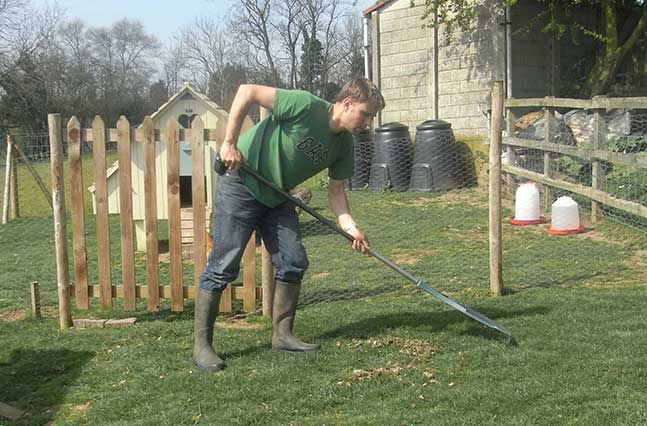
Cleaning a chicken run by raking droppings during dry weather.
General cleanliness is of course important so if your chickens scratch around in their own droppings, you should be thinking about cleaning them up, rather than hitting them with a regular dose of chemicals.
Bad Infestations
If you have a bad infestation of worms, you do need to keep in mind that eggs deposited on the ground will re-infect your birds and it is necessary to repeat the treatment before the eggs hatch and grow into adult worms to lay more eggs. This takes 3 weeks for most common worms carried by chickens so I would re-treat after 3 weeks if I suspect a particularly bad case of worms.
Where external parasites are found on the bird (such as Northern fowl mite or lice) a systemic wormer / pour on product containing Ivermectin is useful. This kills a more limited range of worms. Victoria Roberts Diseases’s of Free Range Poultry says it excludes tapeworm and fluke, but these are less common in chickens. It isn’t licence for use on poultry so you would need to go to your vet for their advice.
Please remember this should not replace the advice of a qualified veterinarian who can advise you about worming.
Do you have any advice on worming? Please leave me a comment below.

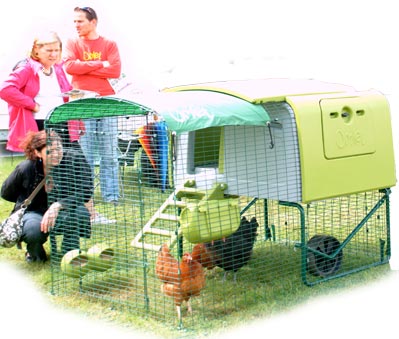

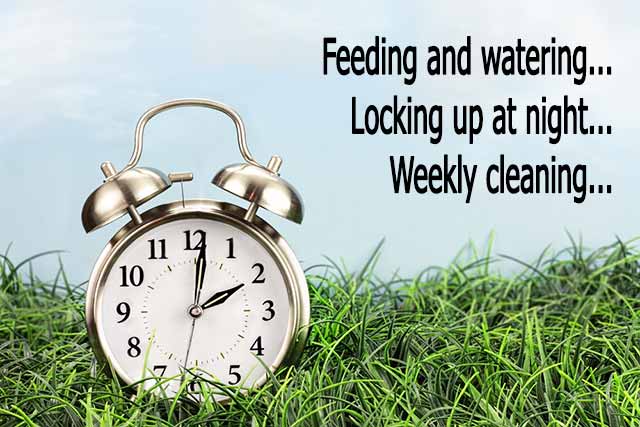
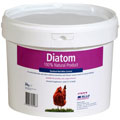
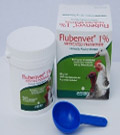
Hi
I have two orpingtons and lately their rear ends have become quite soiled.
They were wormed about two weeks ago with Flubinet after we discovered a round worm in her poop
Should we worm them again and should we clean her up or will she groom herself clean again
Any advice greatfully received.
I would trim her feathers and clean her bottom. Check for lice as well as the eggs are in clumps underneath the bottom at the base of the feather shafts. These can then collect muck.
does worming affect egg laying
No, it doesn’t and there is no egg withdrawal period when using Flubenvet either.
two of my hens stopped laying for 4days of the 7days
Coincidence I’d say. Commercial flocks of 20’000 or more birds are wormed with Flubenvet and carry on laying… If they didn’t they wouldn’t use it. I’ve never seen egg numbers dip when worming either.
At what age would you need to first worm chickens, we are about to get day old chicks
If the ground hasn’t been used by older hens, you should be ok to wait 6 months but if they are going in with other hens or on used ground, worm them when you mix them with the older birds.
If I use vinager and garlic in my chickens water ,will that keep the worms down, or do I still need to use Verm-x?
It will make the gut an unpleasant place for them and also for many bacteria that cause disease.
I wormed my flock 3 weeks ago using flubenvet, I followed the instructions carefully and made sure that the correct dosage was administered. It may be coincidence but during the 7 day worming period 2 of my hens died suddenly. Neither had shown any signs of being unwell prior to this, both of them rapidly became listless and died from a seizure within a few hours. My initial thoughts were that as the rest of the flock were ok it was unlikely to be the medication that was responsible and perhaps they affected hens had eaten something toxic while free ranging.
However, I am following up with a second dose of wormer 3 weeks down the line, today is day 5, and one of my Cock’s is just not himself today, he is not crowing, he is listless but otherwise shows no obvious symptoms. Could this be flubenvet related? It didn’t affect him first time around, so maybe not but I’d be interested to hear fro anyone who has had a similar experience.
I have never (in 12+ years of worming chickens using Flubenvet) heard of anyone losing a bird, however vets have spoken about chickens that have a lot of worms becoming impacted in the gut and when they have been treated and worms killed, there have been so many worms releasing toxins that this can kill the bird. It’s a long shot that only a PM would confirm.